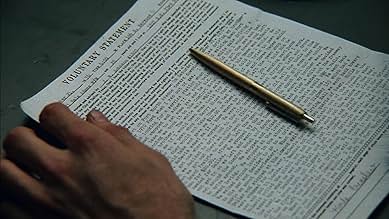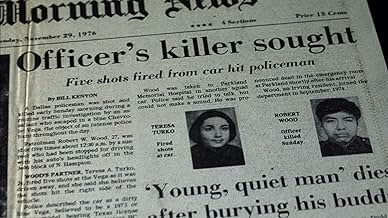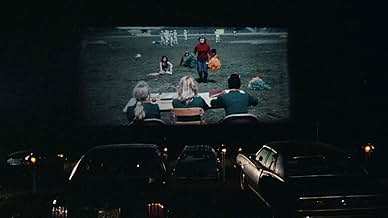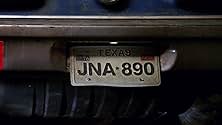AVALIAÇÃO DA IMDb
7,9/10
27 mil
SUA AVALIAÇÃO
Adicionar um enredo no seu idiomaA film that successfully argued that a man was wrongly convicted for murder by a corrupt justice system in Dallas County, Texas.A film that successfully argued that a man was wrongly convicted for murder by a corrupt justice system in Dallas County, Texas.A film that successfully argued that a man was wrongly convicted for murder by a corrupt justice system in Dallas County, Texas.
- Direção
- Roteirista
- Artistas
- Prêmios
- 12 vitórias e 5 indicações no total
Avaliações em destaque
10faraaj-1
I grew up in a society that strongly believes in the death penalty - a religion injunction based on the Islamic code of justice. I remember being told a story (don't know if its true) of how the US President visited Saudi Arabia and on the last day of his visit he was treated to some public be-headings. When he questioned the morality of it, his host informed him that the handful of criminals punished represented the entirety of the criminal population for the past one year. The moral being that harsh punishments prevent crimes and caring too much about the aggressor leads to high crime rates. I personally lost faith in the prison system many years ago after reading about the Milgram and Stanford Prison Experiment findings. A harrowing Australian movie, Ghosts of the Civil Dead made me detest the prison system even more. In recent years Abu Ghraib and Guantanamo have left a bad taste in the mouth. So, is the answer really the death penalty and other physical measures that can't be reversed? After seeing The Thin Blue Line I just don't know. This film has really affected me.
An innocent hitch-hiker, and from what I saw in the documentary a decent man, is caught at the wrong time in the wrong place - a former sundown town called Vidor, Dallas County. He is implicated in the murder of a cop and is obviously innocent of the crime. The entire legal system of Vidor is bent to prosecute him. The reason: the real killer is a 16-year old and there's no benefit in finding him guilty because he can't be given the death penalty. Randall Adams, in his 20's, can and must be punished because he's a stranger to these small-minded bigots and someone must pay! Shocking that people can think that way. It makes The Ox-Bow Incident and issues it raised 70 years ago valid even today. This was no more than a judicial lynching.
Fortunately, in this case Randall Adams' case was reopened and he was acquitted and released, in large measure due to this documentary and the scandal it caused. The story is exceedingly well told and the end with the tape recorded last interview with David Harris is chilling. I can't say that after watching this I still have a clear opinion of what punishment should fit a crime, but it has certainly made me question the validity of the mentality present in so many Muslim countries. Who is to say there can be no similar travesty of justice there?
An innocent hitch-hiker, and from what I saw in the documentary a decent man, is caught at the wrong time in the wrong place - a former sundown town called Vidor, Dallas County. He is implicated in the murder of a cop and is obviously innocent of the crime. The entire legal system of Vidor is bent to prosecute him. The reason: the real killer is a 16-year old and there's no benefit in finding him guilty because he can't be given the death penalty. Randall Adams, in his 20's, can and must be punished because he's a stranger to these small-minded bigots and someone must pay! Shocking that people can think that way. It makes The Ox-Bow Incident and issues it raised 70 years ago valid even today. This was no more than a judicial lynching.
Fortunately, in this case Randall Adams' case was reopened and he was acquitted and released, in large measure due to this documentary and the scandal it caused. The story is exceedingly well told and the end with the tape recorded last interview with David Harris is chilling. I can't say that after watching this I still have a clear opinion of what punishment should fit a crime, but it has certainly made me question the validity of the mentality present in so many Muslim countries. Who is to say there can be no similar travesty of justice there?
This is an extraordinary documentary in which film maker Errol Morris shows how an innocent man was convicted of murdering a policeman while the real murderer was let off scot free by the incompetent criminal justice system of Dallas, Texas. The amazing thing is that Morris demonstrates this gross miscarriage of justice in an utterly convincing manner simply by interviewing the participants. True, he reenacts the crime scene and flashes headlines from the newspaper stories to guide us, but it is simply the spoken words of the real murderer, especially in the cold-blooded, explosive audio tape that ends the film, that demonstrate not only his guilt but his psychopathic personality. And it is the spoken words of the defense attorneys, the rather substantial Edith James and the withdrawing Dennis White, and the wrongfully convicted Randall Adams that demonstrate the corrupt and incompetent methods used by the Dallas Country justice system to bring about this false conviction. Particularly chilling were the words of Judge Don Metcalfe, waxing teary-eyed, as he recalls listening to the prosecutor's summation about how society is made safe by that "thin blue line" of cops who give their lives to protect us from criminals. The chilling part is that while he is indulging his emotions he is allowing the cop killer to go free and helping to convict an innocent man. Almost as chilling in its revelation of just how perverted and corrupt the system has become, was the report of how a paid psychologist, as a means of justifying the death penalty, "interviewed" innocent Randall Adams for fifteen minutes and found him to be a danger to society, a blood-thirsty killer who would kill again.
This film will get your dander up. How the cops were so blind as to not see that 16-year-old David Harris was a dangerous, remorseless psychopath from the very beginning is beyond belief. He even took a delight in bragging about his crime. As Morris suggests, it was their desire to revenge the cop killing with the death penalty that blinded them to the obvious. They would rather fry an innocent man than convict the real murderer, who because of his age was not subject to the death penalty under Texas law. When an innocent man is wrongly convicted of a murder three things happen that are disastrous: One, an innocent man is in jail or even executed. Two, the real guilty party is free to kill again. And, three, the justice system is perverted. This last consequence is perhaps the worst. When people see their police, their courts, their judges condemning the innocent and letting the guilty walk free, they lose faith in the system and they begin to identify with those outside the system. They no longer trust the cops or the courts. The people become estranged from the system and the system becomes estranged from the people. This is the beginning of the breakdown of society. The Dallas cops and prosecutors and the stupid judge (David Metcalfe), who should have seen through the travesty, are to be blamed for the fact that David Harris, after he testified for the prosecution and was set free, did indeed kill again, as well as commit a number of other crimes of violence.
The beautiful thing about this film is, over and above the brilliance of its artistic construction, is that its message was so clear and so powerful that it led to the freeing of the innocent Randall Adams. Although the psychopathic David Harris, to my knowledge, was never tried for the crime he committed, he is in prison for other crimes and, it is hoped, will be there for the rest of his life. Errol Morris and the other people who made this fine film can pride in these facts and in knowing that they did a job that the Dallas criminal justice system was unable to do.
(Note: Over 500 of my movie reviews are now available in my book "Cut to the Chaise Lounge or I Can't Believe I Swallowed the Remote!" Get it at Amazon!)
This film will get your dander up. How the cops were so blind as to not see that 16-year-old David Harris was a dangerous, remorseless psychopath from the very beginning is beyond belief. He even took a delight in bragging about his crime. As Morris suggests, it was their desire to revenge the cop killing with the death penalty that blinded them to the obvious. They would rather fry an innocent man than convict the real murderer, who because of his age was not subject to the death penalty under Texas law. When an innocent man is wrongly convicted of a murder three things happen that are disastrous: One, an innocent man is in jail or even executed. Two, the real guilty party is free to kill again. And, three, the justice system is perverted. This last consequence is perhaps the worst. When people see their police, their courts, their judges condemning the innocent and letting the guilty walk free, they lose faith in the system and they begin to identify with those outside the system. They no longer trust the cops or the courts. The people become estranged from the system and the system becomes estranged from the people. This is the beginning of the breakdown of society. The Dallas cops and prosecutors and the stupid judge (David Metcalfe), who should have seen through the travesty, are to be blamed for the fact that David Harris, after he testified for the prosecution and was set free, did indeed kill again, as well as commit a number of other crimes of violence.
The beautiful thing about this film is, over and above the brilliance of its artistic construction, is that its message was so clear and so powerful that it led to the freeing of the innocent Randall Adams. Although the psychopathic David Harris, to my knowledge, was never tried for the crime he committed, he is in prison for other crimes and, it is hoped, will be there for the rest of his life. Errol Morris and the other people who made this fine film can pride in these facts and in knowing that they did a job that the Dallas criminal justice system was unable to do.
(Note: Over 500 of my movie reviews are now available in my book "Cut to the Chaise Lounge or I Can't Believe I Swallowed the Remote!" Get it at Amazon!)
Randall Adams was a drifter who was picked up by runaway teenager David Harris when he ran out of petrol. The two men hang out for a while, drank some beer, went to the movies, smoked some weed. At this point Adams says he went his own way to his motel with his brother, watched TV and went to sleep. Alternatively, Harris says the two men stayed together were stopped by the police when Adams took out a gun and opened fire on a police officer before driving off. This film follows the court case which charged Adams for the murder of a police officer, with the underage Harris (who was ineligible for the death penalty) as one of the main witnesses against him.
I do enjoy a Perry Mason film because, after a solid hour of red herrings and question-marks, it always come down to the big reveal with Mason demanding "isn't it true? ISN'T IT?" as everyone gasps, the guilty confesses on the stand and justice is done. Sadly this is not a documentary but a basic TVM series and what the Thin Blue Line does so effectively is to get passed all our ideas of how justice works from films and presents a near-unquestionable miscarriage of justice. At no point does the "guilty" person get totally exposed (although the suggestion is very clearly there as to who it was) but instead Morris goes after the idea of reasonable doubt (which, if there is any, then the charged should not have been convicted). Starting at the very start of the fateful evening, Morris uses interviews and some reconstructions to tell the story of what happened from various points of view initially with a focus very much on the events as the courts saw it.
From here he then uses these same contributions to inject a huge amount of doubt into the vast majority of the case for the prosecution. If you want to find it, there are things in here that could be taken as anti-death penalty but for me the film is pro-justice as opposed to anti-anything as it is essentially reinforcing the importance of reasonable doubt. By virtue of doing this, everyone involved looks bad and Morris wisely doesn't need to pick on anybody in particular directly. It is fascinating as a film but I can understand the occasional claim of it being "dull" I cannot agree with it but I can understand because, in a world where excess is the norm (style, action, violence, opinion) anything that is actually restrained and even handed could be taken as "dull".
This modern moaning aside though, The Thin Blue Line is a well made film that simply and matter-of-factly condemns the justice system as it applied to Randall Adams. One of Morris' best films and worth seeking out.
I do enjoy a Perry Mason film because, after a solid hour of red herrings and question-marks, it always come down to the big reveal with Mason demanding "isn't it true? ISN'T IT?" as everyone gasps, the guilty confesses on the stand and justice is done. Sadly this is not a documentary but a basic TVM series and what the Thin Blue Line does so effectively is to get passed all our ideas of how justice works from films and presents a near-unquestionable miscarriage of justice. At no point does the "guilty" person get totally exposed (although the suggestion is very clearly there as to who it was) but instead Morris goes after the idea of reasonable doubt (which, if there is any, then the charged should not have been convicted). Starting at the very start of the fateful evening, Morris uses interviews and some reconstructions to tell the story of what happened from various points of view initially with a focus very much on the events as the courts saw it.
From here he then uses these same contributions to inject a huge amount of doubt into the vast majority of the case for the prosecution. If you want to find it, there are things in here that could be taken as anti-death penalty but for me the film is pro-justice as opposed to anti-anything as it is essentially reinforcing the importance of reasonable doubt. By virtue of doing this, everyone involved looks bad and Morris wisely doesn't need to pick on anybody in particular directly. It is fascinating as a film but I can understand the occasional claim of it being "dull" I cannot agree with it but I can understand because, in a world where excess is the norm (style, action, violence, opinion) anything that is actually restrained and even handed could be taken as "dull".
This modern moaning aside though, The Thin Blue Line is a well made film that simply and matter-of-factly condemns the justice system as it applied to Randall Adams. One of Morris' best films and worth seeking out.
The last few years have been a golden age for documentaries. For better or worse, Michael Moore and his undeniable ability for manipulating the cinematic medium have brought this endangered genre into theaters and living rooms across the country. Most of today's casual moviegoers are relatively new to the non-fiction feature. In the case of director Errol Morris' The Thin Blue Line (1988), one film not only managed to free an innocent man from a lifetime in prison, but it also elicited a confession from the guilty party. After collecting dust on video shelves for over fifteen years, this groundbreaking documentary has finally arrived on DVD.
Unless you're a devout cinephile or a video store clerk, you have probably never heard much about Errol Morris. As a member of the former category, I've been a fan of his since first renting The Thin Blue Line more than a decade ago. As I popped in that dusty VHS cassette and sat back, I relished what many critics and documentary purists had been hotly debating: Morris was taking the genre to exciting new places, whether people liked it or not.
As with all successful movies, a good doc needs a good story. In 1976, Dallas County police officer Robert Wood and his partner were patrolling their district late one night. The two pulled a blue car over to the side of the road, most likely to warn the driver of a busted taillight. Moments later Officer Wood was lying on the ground, fatally wounded by a series of gunshots. His partner quickly ran to his aid, but was unable to accurately retain and recall certain information about the killer's vehicle. Was it a Vega or a Comet? Did the driver have bushy hair or a fur-lined collar? These and many other questions emerged during the rushed investigation to bring the mysterious cop-killer to justice.
The film itself opens more than ten years after the murder took place. Randall Adams, an oddly charismatic good ol' boy sits before the camera, revealing what happened that unfortunate evening in late 1976. He admits to having shared a ride with a young kid named David Harris. The two apparently attended a drive-in double feature, where they both drank beer and smoked marijuana. Shortly thereafter, Adams claims to have been dropped off at his motel for the evening. Meanwhile, Morris shows us the aforementioned David Harris, now in his mid-20s, talking cryptically about that night's events. This real-life Rashomon confronts viewers with several versions of "the truth." It's unclear whether Morris instinctively knew the truth was still out there when he decided to pursue this project, but his previous experience as a private investigator seems to have paid off as we witness his off- camera interrogation of these two men.
Adams, responsible or not, was determined guilty by the courts and sentenced to death. Despite having a police record as long as his shadow, David Harris became the primary witness against Adams in the case. His testimony alone might not have hung Adams, but at the last minute a trio of eyewitnesses to the crime emerged to corroborate his story. In the world of Errol Morris, people are a truly strange lot, and his greatest technique is to simply let his subjects talk and talk until their inherent weirdness becomes painfully evident. Such is the case with the three last-minute witnesses in the Adams case. The more we hear them speak, the greater that uneasy feeling in our stomach and chest becomes. We are bearing witness to a catastrophic miscarriage of justice.
Morris employs a bottomless bag of tricks in this landmark film. While much of the film does rely on the presence of talking heads, he adds other elements to the mix, such as old movie footage, a haunting score by renowned composer Philip Glass, and the granddaddy of documentary no-no's: dramatic re-enactments. The latter tends to be the most challenged aspect of The Thin Blue Line, but Morris uses it fairly and wisely. He tells this twisted tale in ways few people could. A shot of a swaying timepiece or a concession stand popcorn machine suddenly amount to much more than what we're simply seeing on the screen. All of these pieces are being put together, little by little, in the hopes that by the end we will see the bigger picture.
When this movie was released in 1988, it was marketed as a non-fiction film, because the word "documentary" was thought to scare off ticket-buyers. The studio's attempts to pass it off as a murder mystery failed, but the movie made a minor splash once it hit video. It picked up plenty of awards from festivals and critics groups, but the Oscars didn't even bother nominating it. In fact, the Academy didn't so much as nod in Morris' direction until early 2004, when they nominated The Fog of War, his powerful, relevant look at former U.S. Secretary of Defense, Robert McNamara. That film and Morris' two previous masterpieces, Mr. Death and Fast, Cheap & Out of Control have been available on DVD for some time. His first three films, Gates of Heaven, Vernon, Florida, and The Thin Blue Line, were recently made available either individually or in a 3-disc box set. All six of these films are unique, intriguing portals into Mr. Morris' strange universe, which is not so distant from our own. If it's dramatic situations, reality TV, or simply a great movie that you want, look no further than The Thin Blue Line. As one of the greatest documentaries of our time, it is all these things and so much more.
Rating: A
Unless you're a devout cinephile or a video store clerk, you have probably never heard much about Errol Morris. As a member of the former category, I've been a fan of his since first renting The Thin Blue Line more than a decade ago. As I popped in that dusty VHS cassette and sat back, I relished what many critics and documentary purists had been hotly debating: Morris was taking the genre to exciting new places, whether people liked it or not.
As with all successful movies, a good doc needs a good story. In 1976, Dallas County police officer Robert Wood and his partner were patrolling their district late one night. The two pulled a blue car over to the side of the road, most likely to warn the driver of a busted taillight. Moments later Officer Wood was lying on the ground, fatally wounded by a series of gunshots. His partner quickly ran to his aid, but was unable to accurately retain and recall certain information about the killer's vehicle. Was it a Vega or a Comet? Did the driver have bushy hair or a fur-lined collar? These and many other questions emerged during the rushed investigation to bring the mysterious cop-killer to justice.
The film itself opens more than ten years after the murder took place. Randall Adams, an oddly charismatic good ol' boy sits before the camera, revealing what happened that unfortunate evening in late 1976. He admits to having shared a ride with a young kid named David Harris. The two apparently attended a drive-in double feature, where they both drank beer and smoked marijuana. Shortly thereafter, Adams claims to have been dropped off at his motel for the evening. Meanwhile, Morris shows us the aforementioned David Harris, now in his mid-20s, talking cryptically about that night's events. This real-life Rashomon confronts viewers with several versions of "the truth." It's unclear whether Morris instinctively knew the truth was still out there when he decided to pursue this project, but his previous experience as a private investigator seems to have paid off as we witness his off- camera interrogation of these two men.
Adams, responsible or not, was determined guilty by the courts and sentenced to death. Despite having a police record as long as his shadow, David Harris became the primary witness against Adams in the case. His testimony alone might not have hung Adams, but at the last minute a trio of eyewitnesses to the crime emerged to corroborate his story. In the world of Errol Morris, people are a truly strange lot, and his greatest technique is to simply let his subjects talk and talk until their inherent weirdness becomes painfully evident. Such is the case with the three last-minute witnesses in the Adams case. The more we hear them speak, the greater that uneasy feeling in our stomach and chest becomes. We are bearing witness to a catastrophic miscarriage of justice.
Morris employs a bottomless bag of tricks in this landmark film. While much of the film does rely on the presence of talking heads, he adds other elements to the mix, such as old movie footage, a haunting score by renowned composer Philip Glass, and the granddaddy of documentary no-no's: dramatic re-enactments. The latter tends to be the most challenged aspect of The Thin Blue Line, but Morris uses it fairly and wisely. He tells this twisted tale in ways few people could. A shot of a swaying timepiece or a concession stand popcorn machine suddenly amount to much more than what we're simply seeing on the screen. All of these pieces are being put together, little by little, in the hopes that by the end we will see the bigger picture.
When this movie was released in 1988, it was marketed as a non-fiction film, because the word "documentary" was thought to scare off ticket-buyers. The studio's attempts to pass it off as a murder mystery failed, but the movie made a minor splash once it hit video. It picked up plenty of awards from festivals and critics groups, but the Oscars didn't even bother nominating it. In fact, the Academy didn't so much as nod in Morris' direction until early 2004, when they nominated The Fog of War, his powerful, relevant look at former U.S. Secretary of Defense, Robert McNamara. That film and Morris' two previous masterpieces, Mr. Death and Fast, Cheap & Out of Control have been available on DVD for some time. His first three films, Gates of Heaven, Vernon, Florida, and The Thin Blue Line, were recently made available either individually or in a 3-disc box set. All six of these films are unique, intriguing portals into Mr. Morris' strange universe, which is not so distant from our own. If it's dramatic situations, reality TV, or simply a great movie that you want, look no further than The Thin Blue Line. As one of the greatest documentaries of our time, it is all these things and so much more.
Rating: A
"Thin Blue Line" is an early and extended version of "Forensic Files." The biggest difference is that "Forensic Files" focuses on the evidence used to catch a criminal whereas "Thin Blue Line" focused on evidence to exonerate a man falsely accused. Anyone not familiar with "Forensic Files," there's a narrator who recaps important points of the case along with interviews with important people to the case and some reenactment. "Thin Blue Line" had everything but the narrator.
If the justice system has fingered you as the culprit it is usually very hard to prove your innocence. Randall Adams found that out first hand. He was accused of killing a cop in Dallas in cold blood. There was very little evidence to tie him to the crime, but law enforcement saw to it that they got enough to convince a jury of his guilt.
The documentary isn't riveting by any means, and it's really a wonder why this case of who-knows-how-many was chosen for a documentary when there were probably far more egregious cases of injustice out there. Still, the documentary is good, especially for anyone concerned with the halls of justice.
If the justice system has fingered you as the culprit it is usually very hard to prove your innocence. Randall Adams found that out first hand. He was accused of killing a cop in Dallas in cold blood. There was very little evidence to tie him to the crime, but law enforcement saw to it that they got enough to convince a jury of his guilt.
The documentary isn't riveting by any means, and it's really a wonder why this case of who-knows-how-many was chosen for a documentary when there were probably far more egregious cases of injustice out there. Still, the documentary is good, especially for anyone concerned with the halls of justice.
Você sabia?
- CuriosidadesErrol Morris spent 2-1/2 years tracking down the various players in the Randall Adams case and convincing them to appear in the film.
- Erros de gravaçãoDavid Harris talks about his older brother drowning at the age of four in 1963. He says it occurred "right after President Kennedy was assassinated I believe. Sometime right after that. During the summer". However Kennedy was killed in the third week of November, well after summer.
- Citações
Melvyn Carson Bruder: Prosecutors in Dallas have said for years - any prosecutor can convict a guilty man. It takes a great prosecutor to convict an innocent man.
- Cenas durante ou pós-créditosDrawings from the Bender Visual Motor Gestalt Test © 1946, American Orthopsychiatric Association Inc. and Lauretta Bender, M.D.
Principais escolhas
Faça login para avaliar e ver a lista de recomendações personalizadas
- How long is The Thin Blue Line?Fornecido pela Alexa
Detalhes
- Data de lançamento
- País de origem
- Central de atendimento oficial
- Idioma
- Também conhecido como
- The Thin Blue Line
- Locações de filme
- Empresas de produção
- Consulte mais créditos da empresa na IMDbPro
Bilheteria
- Faturamento bruto nos EUA e Canadá
- US$ 1.209.846
- Fim de semana de estreia nos EUA e Canadá
- US$ 17.814
- 28 de ago. de 1988
- Faturamento bruto mundial
- US$ 1.209.846
- Tempo de duração
- 1 h 41 min(101 min)
- Cor
- Mixagem de som
- Proporção
- 1.85 : 1
Contribua para esta página
Sugerir uma alteração ou adicionar conteúdo ausente





































